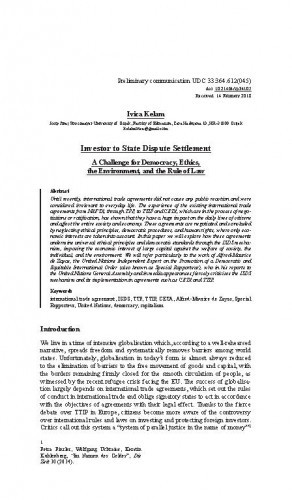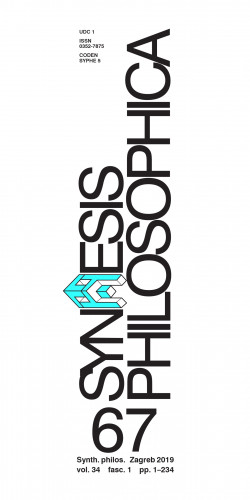Until recently, international trade agreements did not cause any public reaction and were considered irrelevant to everyday life. The experience of the existing international trade agreements from NAFTA, through TPP, to TTIP and CETA, which are in the process of negotiations or ratification, has shown that they have a huge impact on the daily lives of citizens and affect the entire society and economy. These agreements are negotiated and concluded by neglecting ethical principles, democratic procedures, and human rights, where only economic interests are taken into account. In this paper we will explore how these agreements undermine universal ethical principles and democratic standards through the ISDS mechanism, imposing the economic interest of large capital against the welfare of society, the individual, and the environment. We will refer particularly to the work of Alfred-Maurice de Zayas, the United Nations Independent Expert on the Promotion of a Democratic and Equitable International Order (also known as Special Rapporteur), who in his reports to the United Nations General Assembly and in media appearances fiercely criticises the ISDS mechanism and its implementation in agreements such as CETA and TTIP.; Donedavno, međunarodni trgovinski sporazumi nisu izazivali reakcije javnosti i smatrali su se nevažnima za svakodnevni život. Iskušavanje postojećih međunarodnih trgovinskih sporazuma, od NAFTA-e, preko TPP-a, do TTIP-a i CETA-e, koji su u procesu pregovaranja ili ratifikacije, pokazalo je da imaju ogroman utjecaj na svakodnevni život građana te da utječu na cijelo društvo i ekonomiju. Navedeni sporazumi pregovaraju se i zaključuju zanemarujući etičke principe, demokratske procedure i ljudska prava, a u obzir se uzimaju jedino ekonomski interesi. U ovom radu istražujemo kako ti sporazumi narušavaju svima svojstvene etičke principe i demokratske standarde putem izvan-sudskog postupka arbitraže (ISDS; engl. Investor to state dispute settlement), namećući ekonomski interes krupnog kapitala protiv dobrobiti društva, pojedinca i okoliša. Posebno ćemo se referirati na rad Alfreda-Mauricea de Zayasa, neovisna eksperta Ujedinjenih naroda za promicanje demokratskog i pravičnog poretka (također znan i kao posebni izvjestitelj), koji u izvještajima Općoj skupštini Ujedinjenih naroda te u medijima žestoko kritizira ISDS mehanizme i implementiranje u sporazume poput CETA-e i TTIP-a.; Jusqu’à récemment, les accords commerciaux internationaux n’ont pas suscité des réactions dans l’opinion publique et étaient considérés comme non pertinents dans la vie quotidienne. L’expérience dans le domaine des accords commerciaux internationaux en vigueur, de l’ALENA, en passant par le PTPGP, au PTCI et l’AECG, en cours de négociation ou de ratification, a montré qu’ils ont un impact considérable sur la vie quotidienne de l’ensemble de la société et de l’économie. Lesdits accords sont négociés et conclus en négligeant les principes éthiques, les procédures démocratiques et les droits humains, où seuls les intérêts économiques sont pris en compte. Dans cet article, nous explorerons la manière dont ces accords nuisent aux principes éthiques universels et les normes démocratiques par le biais du mécanisme ISDS, imposant l’intérêt économique des gros capitaux au détriment du bien-être de la société, de l’individu et de l’environnement. Nous ferons référence en particulier aux travaux d’Alfred-Maurice de Zayas, Expert indépendant auprès des Nations Unies pour la promotion d’un ordre international démocratique et équitable (également appelé Rapporteur spécial), qui, dans ses rapports à l’Assemblée générale des Nations Unies et dans les interventions médiatiques, critique vivement le mécanisme ISDS et sa mise en œuvre dans des accords tels que le AECG et le PTCI.; irrelevant für das alltägliche Leben betrachtet. Die Erfahrungen mit den bestehenden internationalen Handelsabkommen, von NAFTA über TPP bis TTIP und CETA, die sich derweil im Prozess der Verhandlungen bzw. Ratifizierung befinden, haben gezeigt, dass sie eine enorme Einwirkung auf das tägliche Leben der Bürger ausüben und die gesamte Gesellschaft und Wirtschaft betreffen. Diese Abkommen werden ausgehandelt und geschlossen, indem ethische Grundsätze, demokratische Verfahren und Menschenrechte vernachlässigt werden, wobei nur wirtschaftliche Interessen berücksichtigt werden. In diesem Paper werden wir untersuchen, wie diese Abkommen durch den ISDS-Mechanismus universelle ethische Grundsätze und demokratische Standards untergraben und das wirtschaftliche Interesse des Großkapitals dem Wohl der Gesellschaft, des Einzelnen und der Umwelt auferlegen. Wir werden uns speziell auf die Arbeit von Alfred-Maurice de Zayas beziehen, dem Unabhängigen Experten der Vereinten Nationen für die Förderung einer demokratischen und gerechten internationalen Ordnung (auch als Sonderberichterstatter bekannt), der in seinen Berichten an die Generalversammlung der Vereinten Nationen sowie in seinen Medienauftritten den ISDS-Mechanismus und dessen Einbettung in die Abkommen wie CETA und TTIP heftig kritisiert.
Sažetak

 Synthesis philosophica : 34,1(2019) / editor-in-chief Ante Čović.
Synthesis philosophica : 34,1(2019) / editor-in-chief Ante Čović.